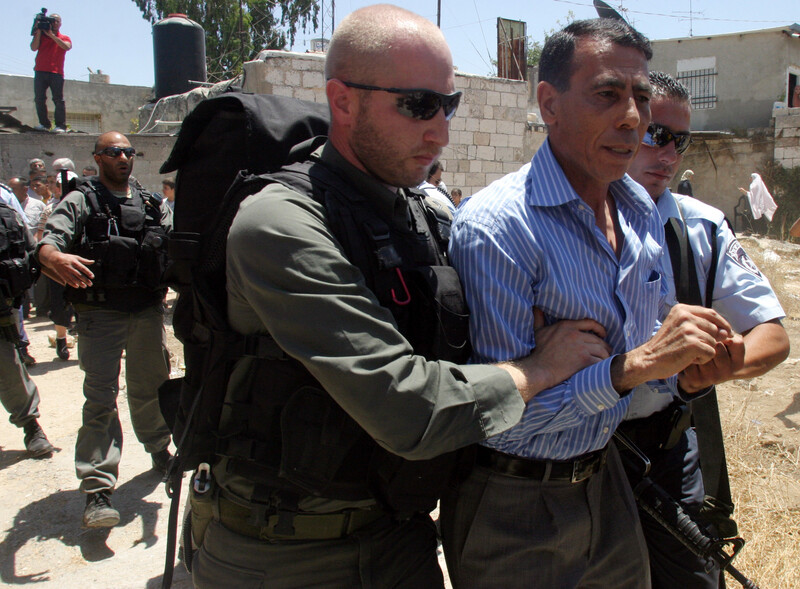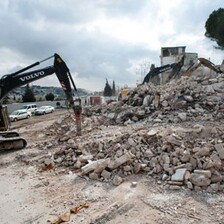The Electronic Intifada Jerusalem 26 February 2013

Israel evicts Palestinians from their homes in Sheikh Jarrah to Judaize Jerusalem.
APA imagesOn 8 February, a tent was set up in the Sheikh Jarrah neighborhood of occupied East Jerusalem to protest against the evictions being undertaken by Israel.
Erecting such tents is a currently popular tactic in the Palestinians’ struggle against occupation and apartheid. In the last six weeks, at least five “tent cities” have gone up in the West Bank, including Bab al-Shams, erected in opposition to plans to develop Israeli settlements in the “E-1” area between East Jerusalem and the settlement of Maale Adumim.
Although organizers of the demonstration in Sheikh Jarrah downplayed the connection to Bab al-Shams, it’s easy to see similarities: the Sheikh Jarrah tent, too, is a statement of protest against Israeli settlements.
Another similarity is the response by Israeli authorities. Although the tent is directly in front of a private home and clearly poses no danger to anyone or anything, police in Jerusalem have twice dismantled the tent. Sheikh Jarrah residents say they will continue to erect the tent during demonstrations held every Friday until the campaign of evictions stops.
The protest tent in Sheikh Jarrah stands in front of the home of the Shamasne family, who have been ordered to leave their home by 1 March, although Israel’s high court is currently considering a petition to overturn the eviction order. The eviction of the Shamasne family is the latest in a long line of evictions in Sheikh Jarrah aimed at removing Palestinians from the area and replacing them with Jewish Israeli settlers.
“This is an Israeli campaign against us and we will stay here and stand fast,” said Mohammad Shamasne, one of the organizers of the demonstration. Shamasne lives in the house facing eviction along with his parents, his wife and their six children.
Palestinians in Sheikh Jarrah have been demonstrating against evictions since 2009. The demonstrations are sometimes attended by more Israeli and international activists than Sheikh Jarrah community members, and this demonstration had a high number of them among its 150 or so attendees. But many more Sheikh Jarrah residents turned out than they usually do for the weekly protests.
“Fighting for our homes
“It’s not a protest for the Shamasne family only,” said Sheikh Jarrah resident Adulrazak Sheikh Omar. “We protest because we believe it is a threat to all the community here … it’s not us in solidarity with the Shamasne [family]. It’s us fighting for our homes.”
The evictions in Sheikh Jarrah rely on a complex legal methodology that basically comes down to recognizing the right of all Jews to live in Israel, but not the right of Palestinian refugees to return home.
Before the creation of the State of Israel, the land of Sheikh Jarrah was administered by the Islamic Waqf, or religious endowment in Jerusalem, explained Fayrouz Sharqawi of the Sheikh Jarrah-based organization Grassroots Jerusalem. The land was parceled up and rented out to Jews who came to Palestine as part of the early Zionist movement. After the Nakba — the ethnic cleansing that led to Israel’s establishment in 1948 — Sheikh Jarrah fell outside the boundaries of Israel, and the homes changed hands and were given to Palestinian refugees.
After the 1967 War, Israel expanded its boundaries and took Sheikh Jarrah. The homes fell under the authority of Israel’s Guardian of Absentee Properties. The families of Sheikh Jarrah were originally given “protected tenant” status, meaning they could not be evicted.
But the Guardian of Absentee Properties soon began changing the contracts, which were written in Hebrew. Many residents of Sheikh Jarrah signed away their protected tenant status without understanding what they were doing.
Sheikh Omar, a resident of Sheikh Jarrah, said the Guardian of Absentee Properties came to his house when his wife was sick, offering her a new contract that would supposedly help pay her medical bills. Then the guardian ordered an appraisal of the house, and dramatically raised the rent based on the newly appraised value.
The evictions are part of a new tactic that Sharqawi and Sheikh Omar say is driven by Aryeh King, a prominent figure in the settler movement. The spotlight has been on King recently for his role in evictions in the Beit Hanina area of East Jerusalem.
Members of King’s Israel Land Fund, they said, dig up the documents from the Islamic Waqf, when the land was rented to Jews whose families now live in Israel. They then present the documents to the descendants of the deed holders, most of whom hadn’t realized their family once lived in Sheikh Jarrah, and offer to buy the homes from them.
“For them, it’s just 50,000 shekels [$13,500] for something they didn’t even think about before,” Sharqawi said.
“Double standards”
After obtaining the deed to the house, the Israel Land Fund takes the current occupants of the house to court and obtains an eviction notice. Several families in Sheikh Jarrah have already been evicted through this method.
The irony of it, of course, is that Palestinians have never been granted the right to return to the homes their parents and grandparents were displaced from, but Israel is now recognizing the right of Jewish citizens to return to homes once occupied by Jews.
“Ok, take the house, just give me back my house on the other side of West Jerusalem … just don’t use double standards,” Sheikh Omar said. “If you’re claiming it’s the right of return for Jewish families living here before ‘48, then you have to give us back our houses, too.”
Mohammad Shamasne echoed Sheikh Omar’s sentiments.
“If Israel really wants to show itself as a just state, claiming that this land belongs to Jews, then we would like to go back to our homes we have been thrown out of,” he said. “Israel shows off that it is a democratic island in the Middle East, but in fact it is evicting people from their homes and throwing them in the street.”
The campaign of evictions in Sheikh Jarrah had stopped in response to ever-larger protests in the neighborhood, but in the last couple months, they resumed again.
“No faith” in Israeli justice
“They do it in waves,” Sheikh Omar said. “They don’t want to do it all at once so it doesn’t raise much objection from the outside.”
The evictions are part of a sustained campaign to force Palestinians from Jerusalem. Sheikh Omar said the Israeli authorities use a variety of tactics, like taking away residency status from Palestinians who are abroad for more than three years, preventing them from ever returning.
“It’s a big project. It’s not only here. Here they use eviction orders, in other places they use demolition orders,” Sheikh Omar said. “The goal is to displace the whole of the Palestinian population in all of Jerusalem.”
The protest tent in front of the Shamasne home is a stand against this policy and a statement that the community of Sheikh Jarrah will not leave their homes quietly.
“We have no faith in the Israeli judicial system,” Mohammed Shamasne said. “Putting up a tent here is our way to raise our voice and be heard around the world.”
Andrew Beale is an independent journalist from New Mexico. He reports on politics and social justice issues in the United States and Mexico as well as the Middle East.




